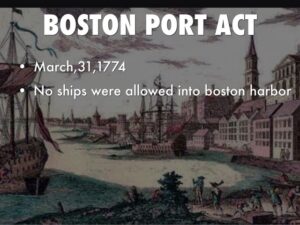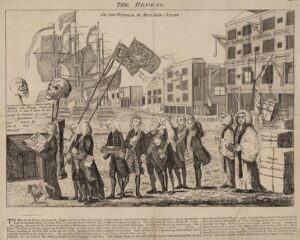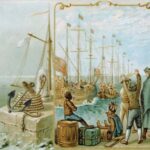boston port act
 After the Boston Tea Party on December 16, 1773, the tensions between the British Parliament and the American Colonies seethed for months. Then, on March 25, 1774, the British Parliament took the next step in its reign of tyranny, when it passed the Boston Port Act. The Boston Port Act closed the port of Boston to all incoming and outgoing ships, while demanding that the city’s residents pay for the nearly $1 million worth (in today’s money) of tea dumped into Boston Harbor during the Boston Tea Party. The act basically held the city under siege, while demanding a ransom for its release.
After the Boston Tea Party on December 16, 1773, the tensions between the British Parliament and the American Colonies seethed for months. Then, on March 25, 1774, the British Parliament took the next step in its reign of tyranny, when it passed the Boston Port Act. The Boston Port Act closed the port of Boston to all incoming and outgoing ships, while demanding that the city’s residents pay for the nearly $1 million worth (in today’s money) of tea dumped into Boston Harbor during the Boston Tea Party. The act basically held the city under siege, while demanding a ransom for its release.
The Boston Port Act was the first and easiest to enforce of the four acts that resulted from the Boston Tea Party. Together, there were four acts, and they were known as the Coercive Acts. The other three were a new Quartering Act, the Administration of Justice Act, and the Massachusetts Government Act. These were passed as part of the Crown’s attempt to intimidate Boston’s increasingly unruly residents. King George III appointed General Thomas Gage, who commanded the British army in North America, as the new governor of Massachusetts in 1774, before the Massachusetts Government Act revoked the colony’s 1691 charter and curtailed the powers of the traditional town meeting and colonial council. Probably the biggest mistake the British made was in not understanding that the main reason the colonists left Britain was to get far enough away from Crown rule to live their own lives. These acts made it very clear to Bostonians that the crown intended to impose martial law, and that was something they just would not stand for.
Gage got right down to business, when in June, he easily sealed the ports of Boston and Charlestown using the formidable British navy. This act left merchants terrified of impending economic disaster. In their panic, many merchants simply wanted to pay for the tea and disband the Boston Committee of Correspondence, which had served to organize anti-British protests. Little did they know that to “bend their knees” to the tyranny would only have served to make matters worse. People make big mistakes when they get in fear. The merchants tried to convince their neighbors to appease the British in the hope of everything just “going away,” but that would never have been the case. A town meeting was called to discuss the matter, and the idea was immediately voted down by a substantial margin.
Parliament hoped that the Coercive Acts would isolate Boston from Massachusetts, Massachusetts from New England, and New England from the rest of North America, thereby preventing unified colonial resistance to the 
 British. Again, they misjudged the colonists, and their effort backfired. Rather than abandon Boston, the colonial population shipped much-needed supplies to Boston and formed extra-legal Provincial Congresses to mobilize resistance to the crown. By the time Gage attempted to enforce the Massachusetts Government Act, his authority had eroded beyond repair. It was another “shot to the heart” of the crown, that would ultimately lead to their complete downfall.
British. Again, they misjudged the colonists, and their effort backfired. Rather than abandon Boston, the colonial population shipped much-needed supplies to Boston and formed extra-legal Provincial Congresses to mobilize resistance to the crown. By the time Gage attempted to enforce the Massachusetts Government Act, his authority had eroded beyond repair. It was another “shot to the heart” of the crown, that would ultimately lead to their complete downfall.

